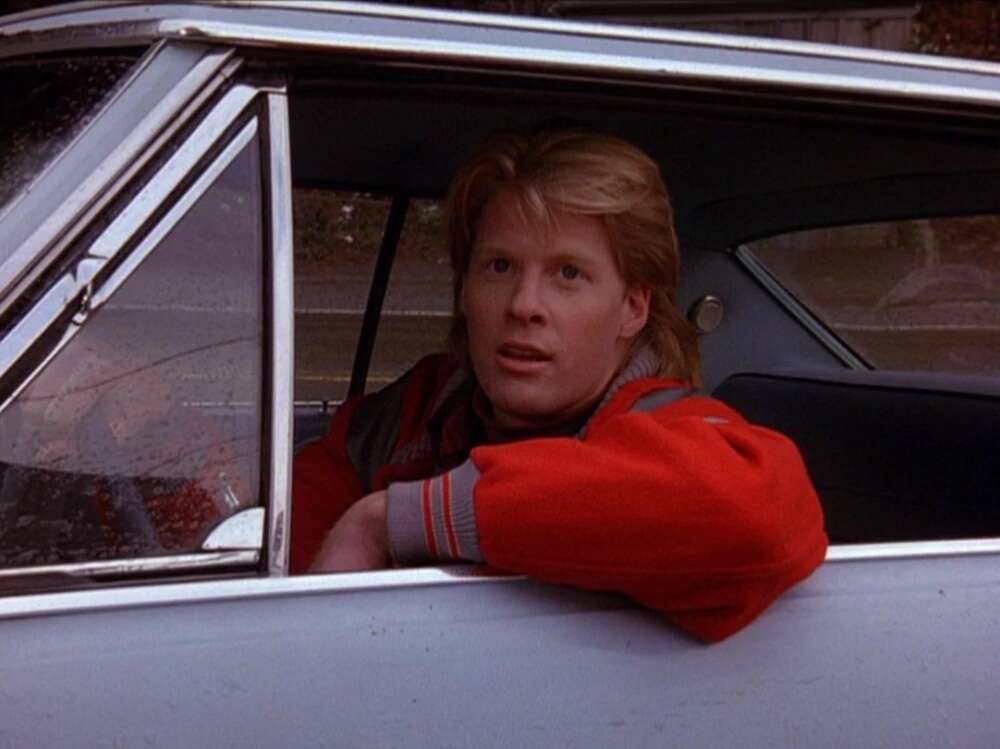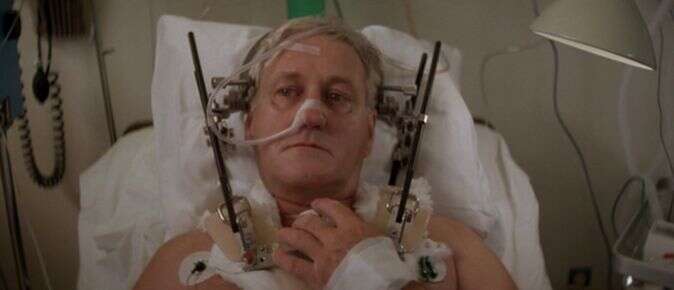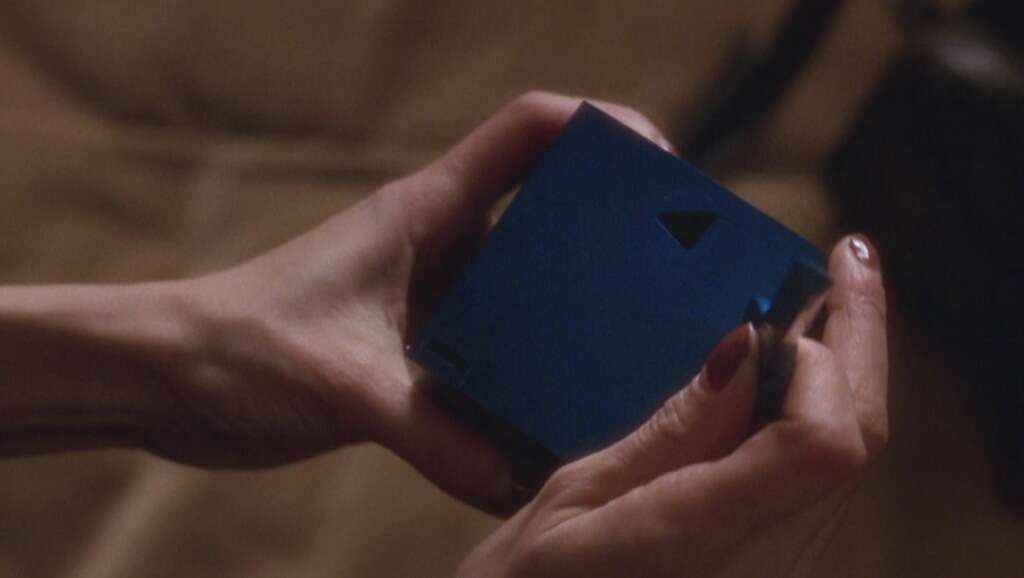I have been informed, by many enthusiastic practitioners of polyamory—people who date, love, and even marry more than one individual at a time—that quite a number of great works of art can be understood by enlightened modern audiences to be about how superior polyamory is as a way of handling relationships.
Hamlet, for example, is no longer a play about the horrible price of vengeance: it's about how Hamlet's uncle Claudius wouldn't have had to kill his father had his mother been permitted to sleep with two men at a time. A classic example of male possessiveness! The One I Love, a surreal horror-romance in which a couple is asked to pick between their actual partner and an idealized version of their partner, could have been far less harrowing if they could have picked both versions of their partner instead. (This, I have been further informed, does not misinterpret the movie's point whatsoever.)
Last night, I was fortunate enough to catch David Lynch's masterful Blue Velvet in theaters. Lynch has long been an artistic idol of mine, and Blue Velvet is considered to be the first movie where he really finds his voice, subverting Americana, delving deep into strange erotic fascinations, and exploring people's struggles as they attempt to navigate civilized society and wilder emotional impulses. But it is also, I realized, a movie about how toxic monogamy is as a relationship model, and how every problem with America and the human psyche could probably be solved with a little polyamory.
Let's examine, together, some of the central tensions in this famously tense film, and look at how virtually all of them could have been resolved with a well-worn copy of The Ethical Slut.
[trigger warning: the entire plot of Blue Velvet]
Hamlet, for example, is no longer a play about the horrible price of vengeance: it's about how Hamlet's uncle Claudius wouldn't have had to kill his father had his mother been permitted to sleep with two men at a time. A classic example of male possessiveness! The One I Love, a surreal horror-romance in which a couple is asked to pick between their actual partner and an idealized version of their partner, could have been far less harrowing if they could have picked both versions of their partner instead. (This, I have been further informed, does not misinterpret the movie's point whatsoever.)
Last night, I was fortunate enough to catch David Lynch's masterful Blue Velvet in theaters. Lynch has long been an artistic idol of mine, and Blue Velvet is considered to be the first movie where he really finds his voice, subverting Americana, delving deep into strange erotic fascinations, and exploring people's struggles as they attempt to navigate civilized society and wilder emotional impulses. But it is also, I realized, a movie about how toxic monogamy is as a relationship model, and how every problem with America and the human psyche could probably be solved with a little polyamory.
Let's examine, together, some of the central tensions in this famously tense film, and look at how virtually all of them could have been resolved with a well-worn copy of The Ethical Slut.
[trigger warning: the entire plot of Blue Velvet]
Frank and Don
Now, some people may find this a controversial claim. After all, the inciting incident of the whole movie is the discovery of Don's ear, which Frank has cut off of him in order to pressure Don's wife Dorothy into letting him sexually assault her. But think about it for a minute, and you'll realize there is no better evidence that this otherwise-iconic triad really just needs a little bit of polyamory to help them out with their backwater binary thinking.
Don't cut the ear, in other words. Cut the crap!
Frank Booth's iconic line—"I'll fuck anything that moves!"—is perhaps the simplest articulation of Frank's dark and animal nature. He's terrifying because he is completely unafraid of his own id: he will murder whomever he wants, he will take hostages, and he will unrepentantly commit horrific sexual crimes. But really, why should Frank be afraid to admit that he's attracted to another man's wife? And why should he feel any shame over his daddy-baby-mommy-gas mask fetish, which clearly marks a superior understanding of his own sexual palette?
To a more worldly contemporary audience, it's clear that Frank's fondness for murder and mutilation is just an outlet for the energies which monogamy has denied him. Could it be that the real villain of Blue Velvet, lurking in the shadows, is the institution of marriage itself? Maybe, in 2023, we can finally reinterpret the meaning of that severed ear: it now symbolizes the fact that terrible things happen when people are afraid to just listen to their hearts.
Dorothy and Sandy (and Mike and Jeffrey)
One of the most difficult and upsetting scenes in Blue Velvet begins when Dorothy Vallens materializes, naked and battered, in the middle of an otherwise-unassuming suburb. Jeffrey has just been chased down by Sandy's high-school boyfriend Mike, in a strange moment of comic relief—he first assumes that he's being attacked by Frank Booth, instead. And the fight that Mike's raring for immediately diffuses when he sees Dorothy and realizes that Jeffrey's involved in something far stranger, sadder, and darker than any petty relationship jealousy.

Sandy's football-playing high school boyfriend, Mike.
What follows is a disturbing scene in Sandy's house. Dorothy, out of her mind with fear and pain, reaches out to Jeffrey, whose sexual explorations with her have been the closest thing she's found to love and comfort in a long while. Sandy, whose budding relationship with Jeffrey is more chaste—they haven't done more than kiss—is horrified, both by the realization that Jeffrey has been sleeping with this woman and by the sudden awareness of just how much Jeffrey has been sanitizing his narrative for her sake, not just to protect her but to hide evidence of his own disturbing desires. Jeffrey, meanwhile, is torn between comforting Dorothy and comforting Sandy, simultaneously wrenched with empathy for Dorothy and uncomfortably aware that every utterance from her mouth is exposing him to Sandy more—and exposing Sandy to something that he'd been trying to keep her safe from.
It's an overwhelmingly intricate scene whose emotional ranges could be—and have been—unpacked for decades. But does it need to exist? We could have avoided its legendary nuances if Sandy was prepared, instead, to recognize that Jeffrey simply meets different needs with different women. With Sandy, Jeffrey explores the more wholesome and conventional forms of eros and romance, allowing desire to slowly mutate into love. With Dorothy, Jeffrey is confronted with his more primal emotions laid bare, strange and difficult feelings that terrify him. Why shouldn't he be allowed to pursue both at once?
Dorothy is clearly more sophisticated in these matters. Although she is married, she welcomes Jeffrey gratefully into her bed, hunting for even a simulacrum of something she can call love. Yes, her love for Jeffrey is really a kind of transference—she refers to Jeffrey by her husband's name, and clearly is seeking out a phantom love through him—but he is able to provide her with a much-needed solace. Why should she be ashamed of that? "He put his disease in me," she says of Jeffrey—but what's the disease? Perhaps it's a little-examined relationship structure that I like to call monogamy.
Really, the unsung hero of Blue Velvet is Mike, the high-school boyfriend who recognizes, clearly, that his feelings about his girlfriend cheating on him are his own problem to deal with. Blue Velvet is a coming-of-age story, sure... but what if it isn't Jeffrey's story after all? What if this is really the tale of a young teenage boy discovering compersion for the first time?
Jeffrey and Frank
"You're just like me," Frank snarls at Jeffrey, after taking him on a long, surreal, and disturbing joyride. What he means is: You feel this savagery too. You lust for women—and you understand how violent that lust can be. He views Jeffrey as a rival, in a sense—which means he also sees Jeffrey as a kindred spirit.
The next morning, Jeffrey sobs, thinking of the way that he struck Dorothy in a moment of passion, after she shrieked at him to strike her. "Why are there people like Frank?" he asked Sandy much earlier, in a different fit of tears; we now realize that what unsettles him is not Frank, but himself. Blue Velvet is, in part, a story about Jeffrey struggling with the man he is becoming: it is framed by his father's hospitalization, hooked up to machines whose hisses are nearly identical to the hiss of Frank's gas mask, and in the absence of genuine fatherhood, Frank appears to act as a kind of surrogate father, a different vision of a man fully grown.

One of several instances of men seeking solace through inhaled gasses.
Blue Velvet can thus be understood as a narrative about Jeffrey killing and conquering his darker side or as a narrative about him killing and usurping his ersatz father. Frank has contempt for what he sees as Jeffrey's naiveté: it's not just weakness, it's cowardice, a reluctance to admit to a truth. Yet he fears Jeffrey too, for he sees Jeffrey's need to "be a good neighbor" to Dorothy as more than just a hope to save her: it's driven by lust, however sublimated. And in the conflict between civility and carnality, civility can be cast aside, but carnality never can—Jeffrey might repress it or channel it, but it will never go away. ("I still can see blue velvet through my tears," as the song and the movie both end.)
I should scarcely need to say it, but this existential tension could have been done away with, had Frank and Jeffrey both been willing to bond over their similarities instead. The son didn't need to kill his fake dad: instead, he could have welcomed an older mentor, and valued the unrepressed sexual confidence that he found in Frank. Similarly, Frank could have seen in Jeffrey a fond memory of his own tentative youth, or perhaps even a reminder of the better angels of his nature—one that could have pushed him towards more courteous and genteel behaviors, rather than towards the behaviors he exhibits in the movie (such as repeatedly kissing Jeffrey's face before beating the shit out of him in a lumberyard). These two men clearly feel a connection—yet a worldview which can only interpret them as competitors has the unfortunate effect of tearing them apart.
Heineken and Pabst Blue Ribbon
Could it be that David Lynch, visionary that he is, anticipated a more fully awakened society one day rejecting his message of inner conflict and tenuously-negotiated civilization? Perhaps his unconscious mind presented us with a key, knowing that, one day, we would discover what it unlocks?

One of David Lynch's many famous keys (this one from Blue Velvet, 1986).
"Heineken?!" Frank shouts, infuriated, when Jeffrey says that that's his beer of choice. "Fuck that shit! Pabst Blue Ribbon!!!"
But really, do we need to decide between different brands of beer?
I will freely admit to enjoying a good PBR now and again. It's not my everyday beer, but it's a good time just the same. I don't have to forsake it forever just because I'd rather have a Yuengling, or—even better—a Golden or Sour Monkey. Brands don't demand our loyalty; they know we are free to choose between them and their so-called "competitors" at any time.
Why should love be any different? Why should sex be any different? Imagine a world in which these characters, Frank and Jeffrey and Dorothy and Sandy and Mike and Don, could meet together, not in violence, but in love. Imagine the MFMMFM polycule that could ensue. Frank could teach the gang about the benefits of certain inhalants in acts of lovemaking. Jeffrey could teach Frank, and Dorothy too, about more consensual ways of exploring sadomasochism in a relationship. Sandy could regale the group with her fanciful tales of love and robins, as Mike puts that impressive upper body strength to work. And Don... well, we hear him referred to as Van Gogh once, so perhaps Don could bring that unseen artistic prowess to the table, and capture the loving relationships he sees before him in a tableaux as iconic as the one that he himself is in, after Frank murders him and his accomplice and leaves their bodies out in the middle of Dorothy's apartment.
Afterwards, they could all go out and celebrate with a beer—and feel secure in their right to go with any beer they think they'd love.
Except for Heineken. Really, Jeffrey, fuck that shit.